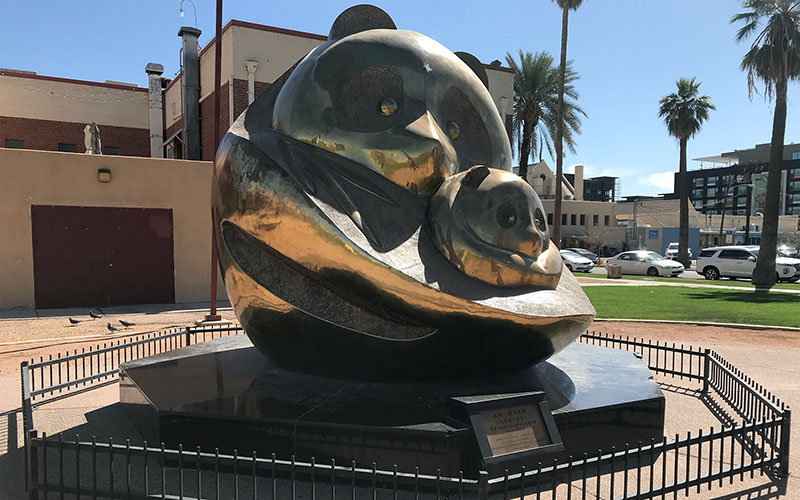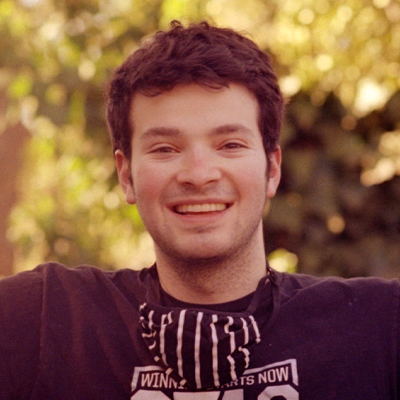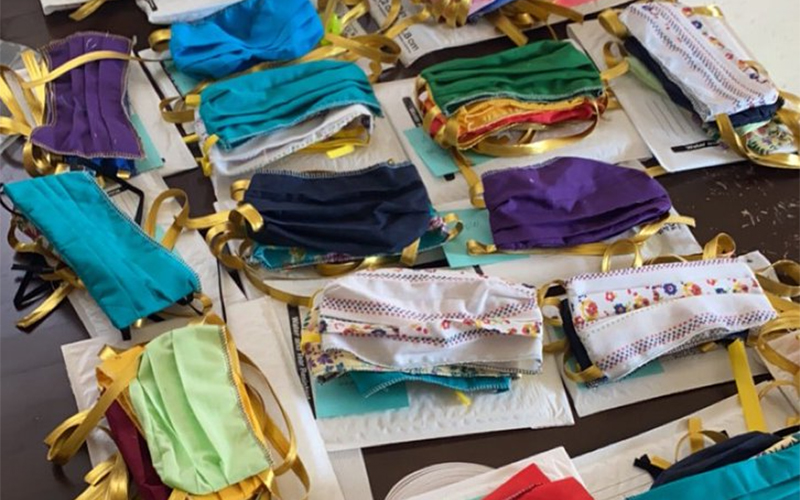
A sculpture in Hance Park titled “Maternal Love,” showing a panda and her cub, was given to Phoenix by its sister city of Chengdu in China. Some critics worry about Chinese government influence on sister city programs, supporters say they can build the people-to-people relationships that governments cannot. (Photo by Henry Greenstein/Cronkite News)
PHOENIX – When President Dwight Eisenhower unveiled what would eventually become Sister Cities International, he saw the federal government, though responsible for foreign policy, as an obstacle to world peace and encouraged local communities to do their part.
When the pandemic hit, that’s exactly what they did.
“Diplomacy on a national level sometimes is fraught, or difficult, or burdened by politics,” said Nikki Hinshaw, who has worked with sister cities in Phoenix and Tempe. “What we call citizen diplomacy, or subnational diplomacy, is really stepping up and filling those gaps and creating connections.”
That was on display last year, when Phoenix Sister Cities Vice President Rick Gerrard made the connections that helped a group of Valley volunteers track down a shipment of urgently needed face masks that were stuck in customs between China and the U.S. Last May, Gilbert received 100 N95 masks for its police officers and firefighters from its sister city, Leshan, China.
Sister Cities International manages over 2,000 sister city partnerships, primarily in the United States. Arizona Sister Cities oversees 59.
Most relationships center on student exchanges; Tempe Sister Cities typically hosts delegates from 11 cities for several weeks over the summer, according to its president, David Carrera.
Gilbert Sister Cities — run by Greg Tilque, the town’s former economic development director — has a commercial focus, which is why solar-powered benches from Antrim and Newtownabbey, in Northern Ireland, now reside in Gilbert’s parks.
Mesa Sister Cities frequently emphasizes humanitarian work, as when it built a senior center in Guaymas, Mexico, and current president Cheryl Laflen, a multiple cancer survivor, sent mastectomy supplies to a breast cancer patient she met there.
“The whole mission of sister cities is a positive one,” Laflen said, “of developing the friendships, maintaining world peace, sharing information and knowledge and whatever you can do.”
Some sister city partnerships arise organically, as when former Mesa Mayor Willie Wong bonded with his ancestral home of Kaiping, China, in 1993. Others develop out of novelty (Dull, Scotland; Boring, Oregon; and Bland Shire, Australia) or pretension (Rome and Paris twin exclusively with each other, claiming “only Rome is worthy of Paris; only Paris is worthy of Rome”).
Sister city bonds can be politically transgressive. When Tempe Sister Cities was founded in 1971, Tempe became the first American city to connect with a partner in communist Eastern Europe: Skopje, Yugoslavia. Phoenix is one of many cities with partners in both China and Taiwan, although the federal government only maintains formal relations with China under the One-China Policy.
“(Cities) don’t have to consider what they’re doing as part of the national foreign policy, the national soft power or public diplomacy goals,” said Ben Leffel, a lecturer at the University of California, Merced who studies city diplomacy. “They can even defy the national government if they wish, and they often do.”
With roots in ninth-century Europe, the concept of sister cities became more formalized in the U.S. after Eisenhower introduced the “People-to-People” program in 1956. The program’s “Civic Committee” evolved into Sister Cities International, the governing body of sister cities in this country.
At his White House Conference on Citizen Diplomacy on Sept. 11, 1956, Eisenhower said the program would let individuals “leap governments — if necessary to evade governments — to work out not one method, but thousands of methods by which people can gradually learn a little bit more of each other.”
Sister city relationships between communities in Arizona and China — Gilbert-Leshan, Mesa-Kaiping, Phoenix-Chengdu and Tempe-Zhenjiang — have provided aid in times of crisis. After the 2008 Sichuan earthquake, Gilbert sent money to Leshan, and Phoenix funded the construction of a school in Chengdu.
“The culture over there is one of trust, and trust had to be built for years and years,” Carrera said.
Carrera took over as president of Tempe Sister Cities weeks before the pandemic hit the U.S.
“Our first decision was to contact Zhenjiang and say, ‘I don’t think we’re going to be sending delegates to Zhenjiang, China, and I don’t think it would be a good idea to have Zhenjiang delegates come here to Tempe,’” Carrera said.
One year later, Tempe Sister Cities was designing a virtual exchange based on “day-in-the-life” experiences and appearances from past delegates, the organization’s first digital programming during the pandemic.
Phoenix has collaborated on several virtual events with Chengdu, including a youth music festival and a “tea tasting across Asia” featuring Japanese, Chinese, and Taiwanese teas, said Gerrard.
Subnational diplomacy is traditionally insulated from national politics. Sister cities are a “win-win” for the U.S. Government, Gerrard said, “because it helps countries abroad, sometimes adversaries of the United States, better understand American culture.”
But Chinese cities are more tied to their national government’s foreign policy objectives, which has alarmed some national officials.
Then-Secretary of State Mike Pompeo declared sister cities a threat in remarks to the National Governors Association in February 2020. In November, Sen. Marsha Blackburn, R-Tenn., introduced the Sister City Transparency Act, calling for an investigation into sister city partnerships and labeling them “Beijing’s newest political weapon.”
Leffel said espionage is conceivable “whenever there’s contact between two sides, just in some places they’re more likely to happen than others.” Sister cities, he said, “is not really one of them.”
Leroy Allala, president of Sister Cities International, called proposals like Blackburn’s “a misunderstanding of the sister city relationship.” Sister cities are led by volunteers who “haven’t been, from my knowledge,” he said, “accessing sensitive government data.”
Arizona’s sister city leaders have encountered pushback on a local level. Tilque, the president of Gilbert Sister Cities, said Gilbert residents have told the Town Council they believe the Chinese are infiltrating local government using the Leshan partnership.
Laflen, who leads Mesa Sister Cities, remains confident in citizen diplomacy amid widespread xenophobia. She said sister cities were founded in similar circumstances in 1956.
“People reaching out, establishing relationships, making friendships, was going to do more to help build world peace than all of the politicians and all of the armies,” she said. “It was true then, and it’s even more so today.”

